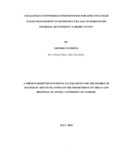| dc.contributor.author | Ochieng, Geofrey | |
| dc.date.accessioned | 2016-11-21T12:16:58Z | |
| dc.date.available | 2016-11-21T12:16:58Z | |
| dc.date.issued | 2016 | |
| dc.identifier.uri | http://hdl.handle.net/11295/97640 | |
| dc.description.abstract | Increased solid waste generation and management problem is largely as a result of rapid urban population growth. The purpose of this study was to examine the challenges and propose possible interventions to ensure effective solid waste management in Ngomongo village of Korogocho informal settlement. The study objectives were to: determine the solid waste management system in the village, identify the main challenges and propose planning interventions for effective SWM in the village. The target population was households and business enterprises within Ngomongo village. A sample size of 140 households and 40 business enterprises were interviewed. The study employed both primary and secondary sources of data. Primary data was collected through administration of questionnaires and interviews of key informants. Observation as well as use of GPS were also employed for the primary data collection. Secondary data collection was in form of literature review. The study found that solid waste management in Ngomongo village is done mainly by youth groups. It is characterised by low levels of waste separation and reuse, erratic collection and poor disposal systems. The study also found that SWM in Ngomongo experiences challenges ranging from lack of proper designated disposal sites leading to poor disposal system, erratic collection system and expensive charges levied by private waste collectors. The planning issues affecting SWM in Ngomongo were lack of designated disposal sites as well as solid waste receptacles, congestion and accessibility problem among others. Overall, SWM in Ngomongo is inadequate. This has the potential for negative environmental and health implications including pollution and spread of diseases. The study therefore recommends that activities of youth groups should be supported in order to increase their capacity as far as collection and disposal of solid waste is concerned. Residents should be sensitized on effective solid waste management especially on separation and recovery of useful material. Solid waste receptacles should be provided in order to act as transfer
xiv
stations from where wastes from Ngomongo can be collected and transported to the final disposal point. Planning will help in siting of the facilities. | en_US |
| dc.language.iso | en | en_US |
| dc.publisher | University of Nairobi | en_US |
| dc.rights | Attribution-NonCommercial-NoDerivs 3.0 United States | * |
| dc.rights.uri | http://creativecommons.org/licenses/by-nc-nd/3.0/us/ | * |
| dc.subject | Solid Waste Management | en_US |
| dc.title | Challenges and Possible Interventions for Effective Solid Waste Management in Ngomongo Village of Korogocho Informal Settlement, Nairobi County | en_US |
| dc.type | Thesis | en_US |



